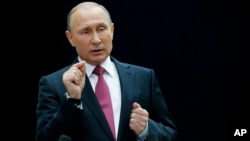Russia's justice ministry has designated nine U.S.-government funded media outlets, including Voice of America, as "foreign agents," a move that could complicate their news-gathering operations in Russia.
The ministry also listed Radio Free Europe/Radio Liberty and seven of its affiliates, after warning last month they could be affected.
The new Russian designation forces the U.S. news outlets to adhere to the same requirements that are applied to foreign-funded non-governmental organizations under a 2012 law. The news outlets, in any information they publish or broadcast to Russian audiences, would be required to mention their designation as a "foreign agent."
They would be required to submit regular reports on their funding, their objectives, how they spend their money and who their managers are.
A spokeswoman for the U.S. State Department, Heather Nauert, told reporters Tuesday that the move is "wrong" and added that the State Department is concerned that the new status might result in harassment of U.S. journalists.
Moscow's action Tuesday came in retaliation to Washington's move last month forcing a U.S.-based affiliate of Kremlin-funded RT, formerly known as Russia Today, to register under the Foreign Agents Registration Act, also known as "FARA." The act requires people acting as agents of foreign governments to publicly disclose their relationship.
Last week, the committee of journalists that issues credentials for media access to cover the U.S. Congress withdrew accreditation for RT, citing the FARA registration. Russia's lower house of parliament, the Duma, says it will vote this week on whether it will ban access for media organizations designated as foreign agents. Russian officials have called the new legislation a "symmetrical response" to what they describe as U.S. pressure on Russian media.
Reaction
Reacting to Russia's move Tuesday, VOA Director Amanda Bennett said the Russian Ministry of Justice has indicated the new designation will involve more "limitations" on the work of VOA in Russia.
"So far, the full nature of these limitations is unknown. We will study carefully all communications from the ministry and other official Russian organizations," Bennett said. "At the same time, we remain committed to continuing to serve as a consistently reliable and authoritative source of news to our Russian-speaking audiences."
VOA's digital, TV and radio news and information reports are carried in more than 40 languages around the world and weekly reach more than 236 million people.
RFE/RL president Tom Kent, in his reaction to the development, vowed that the network remains "committed to continuing our journalistic work, in the interests of providing accurate and objective news to our Russian-speaking audiences."
Radio Free Europe's journalists report news in 23 countries where a free press is banned by the government or not fully established. Five of its affiliates in Russia provide news on Crimea, which Russia annexed from Ukraine in 2014, Siberia, the predominantly Muslim North Caucasus region, provincial Russia and the mostly Muslim region of Tatarstan. It also has an online TV station and a news portal that fact-checks the statements of Russian officials
In an interview with VOA, Congressman Eliot Engel, a ranking member of the House Committee on Foreign Affairs, called the move "ridiculous" but added, "that's typical for a totalitarian state with a totalitarian leader." He said democracy and free speech are "alien concepts" to Russian President Vladimir Putin.
Russian President Vladimir Putin signed a law in November empowering the government to designate media outlets receiving funding from abroad as "foreign agents" and impose sanctions against them.










